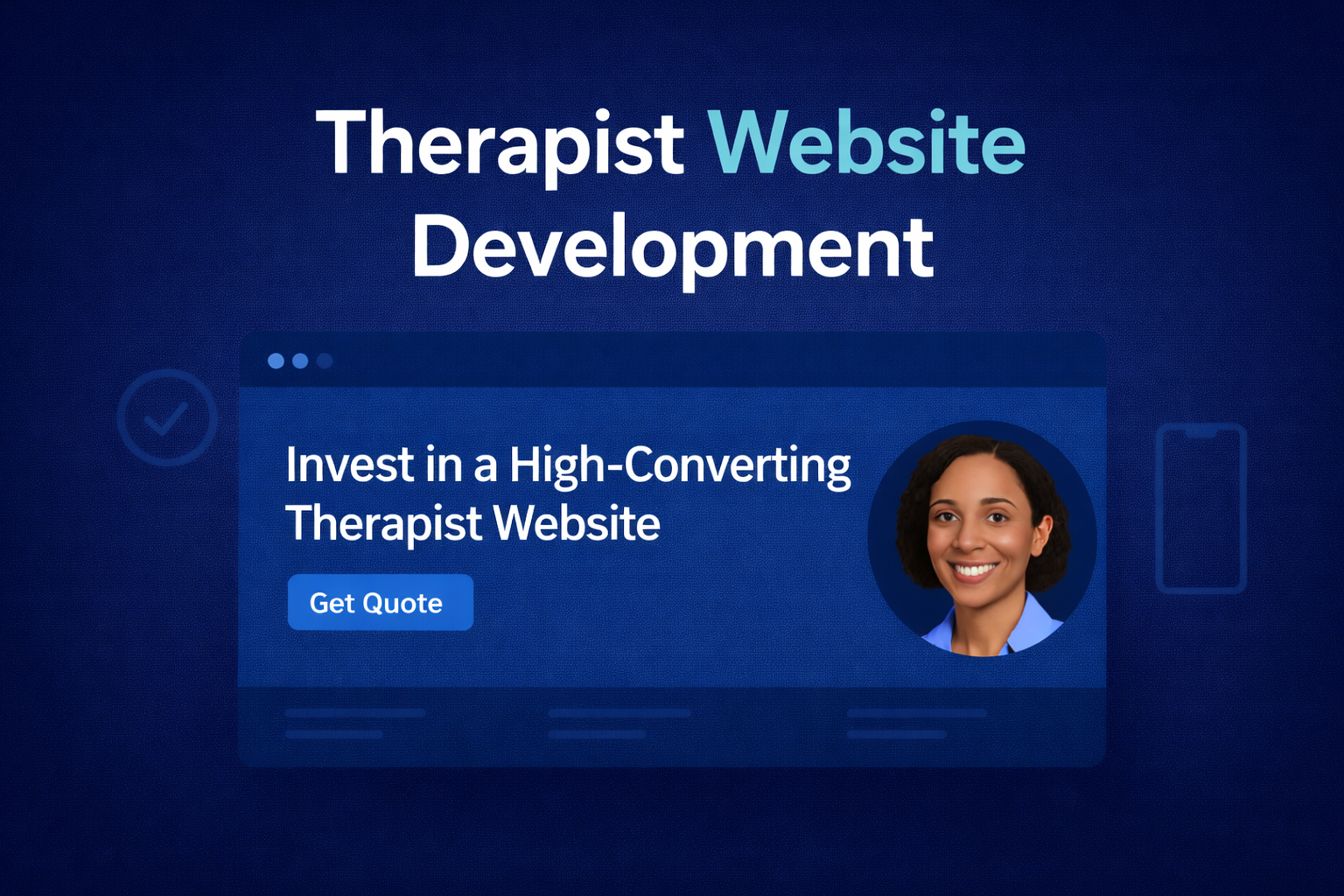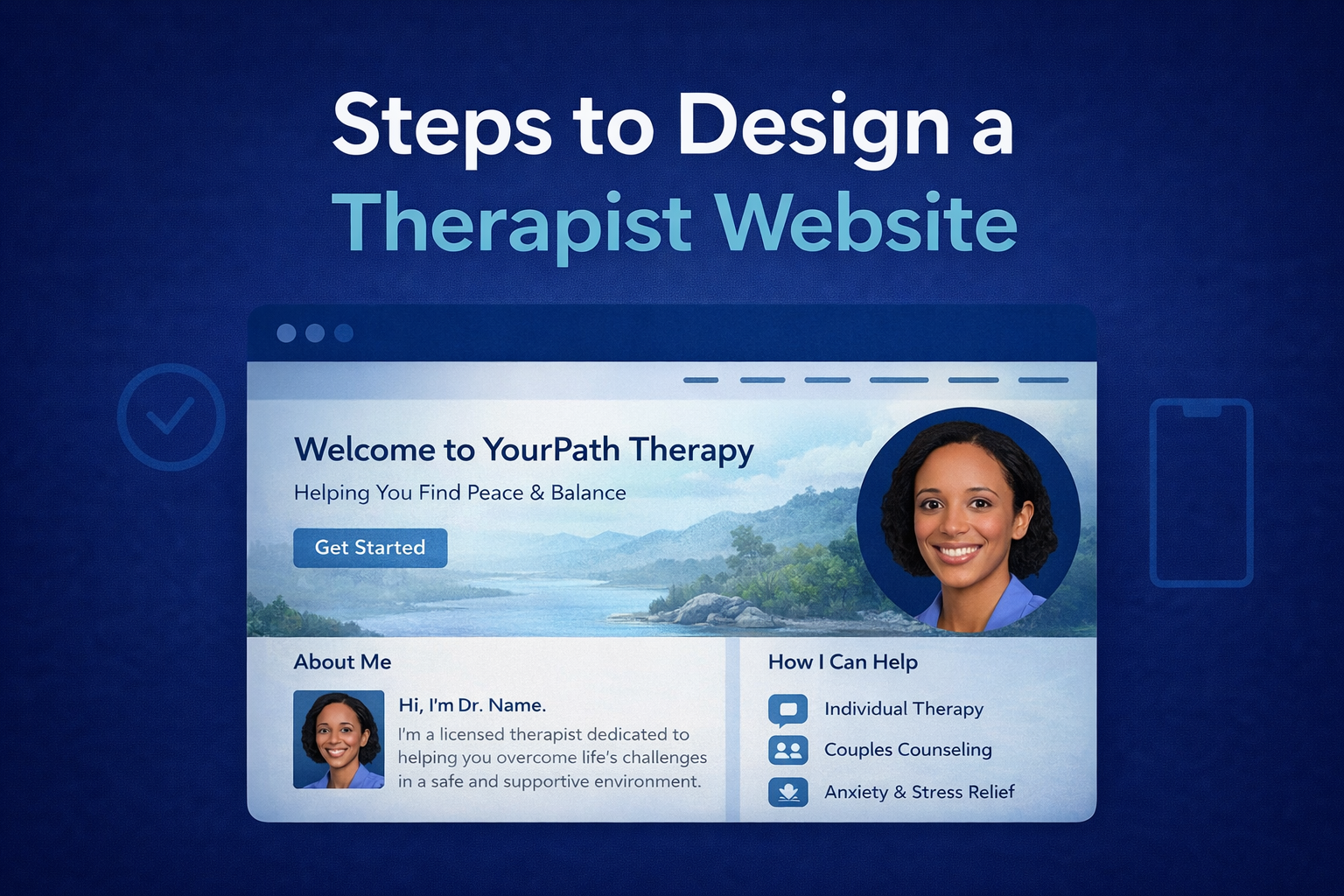The days when therapists relied solely on referrals or directory listings are long gone. Today, prospective clients research mental-health professionals online long before making first contact. Your website is no longer a support tool it is the primary decision-making touchpoint for most clients.
Many therapists share a similar experience: inquiries were consistent for years, but recently began slowing down even as clinical expertise remained strong. On deeper analysis, they discovered that prospective clients were visiting websites of competitors who appeared more credible, more modern, and more aligned with what clients expect during their online search journey. Their own outdated or incomplete website unintentionally redirected client attention elsewhere.
View examples of professionally built therapist websites Click here.
A strong therapist website communicates stability, warmth, professionalism, and emotional safety from the first moment a visitor lands on your homepage. In contrast, a cluttered layout or unclear messaging triggers doubt and causes visitors to leave, often within seconds.
But developing a therapist’s website is not easy. Most clinicians are already overwhelmed with scheduling, documentation, sessions, and administrative responsibilities. Managing design, user experience, SEO, compliance, content writing, and security alone becomes unrealistic.
This is where Mental Health IT Solutions plays an important role. With deep expertise in therapist website development and digital systems for mental-health professionals across the U.S., MHIS builds websites that strengthen credibility, increase inquiries, and support long-term practice growth. The right website isn’t just a digital asset; it’s a strategic foundation for sustainable practice success.
Understanding the Importance of a Website for Therapists

A website is essential for therapists because your website now serves as your digital first impression. Before reaching out, clients evaluate how you present your services, showcase your experience, and communicate your therapeutic approach. A well-structured therapist website provides clarity, comfort, and confidence three qualities clients look for before booking therapy.
Online research is now deeply integrated into mental-health decision-making. Clients compare multiple therapist websites, evaluate how they feel while navigating them, and look for signs of credibility such as professional design, clear service descriptions, transparent pricing, testimonials, and ease of scheduling. If your website lacks these qualities, visitors will quickly move to another practitioner who communicates trust and competence more effectively.
A professionally developed therapist website reinforces your credibility. Clean layouts, intentional branding, concise messaging, and supportive visuals all send a powerful message: “You can trust me with your care.” Without this, the perceived quality of your clinical expertise is weakened even if you are an extraordinary therapist.
Mobile-friendliness is essential for therapists as a significant number of potential clients use mobile devices to seek mental health support. Poor loading times or display issues can degrade user experience and negatively impact conversion rates, regardless of strong SEO strategies.
Therapists who update their websites often experience a notable increase in inquiries due to enhanced organization, modern visuals, streamlined navigation, and improved communication, all of which foster trust and bolster overall SEO visibility and client engagement.
A high-quality website serves not only as a marketing tool but also as a critical component of professional identity and effective growth in SEO for therapists.
Why a Professional Website Matters for Therapists
A well-designed therapist website communicates trust, safety, and professionalism. Clients make snap judgments based on visual cues, tone, and clarity. A strong website showcases:
- Your therapeutic approach
- Your experience and credentials
- Populations you specialize in
- Simple, meaningful calls-to-action such as “Schedule Consultation”
Professional design and consistency reassure visitors that your practice is reliable.
First Impressions: Building Trust Digitally
Clients decide within seconds whether your website “feels right.”
A trustworthy therapist website includes:
- Warm visual branding
- High-quality therapist photos
- Clear, supportive messaging
- Simple, intuitive navigation
Even small design improvements lead to higher engagement and more inquiries.
How Websites Drive Private Practice Growth
A therapist’s website functions as a 24/7 marketing engine. Blog content, resources, FAQs, and niche-specific pages establish your authority and visibility. Optimized therapist website results in more inquiries, stronger trust, and consistent practice growth.
Therapist Website Development Requirements

Security is a defining element of a therapist’s website. Mental-health clients share sensitive information, so your website must demonstrate a commitment to privacy. At a minimum, your therapy practice website must include:
- HTTPS & SSL certificates for encryption
- Secure hosting to prevent vulnerabilities
- Protected contact forms
- Routine backups and server-level security
For U.S. therapists, HIPAA principles must guide any digital interaction involving client information. Your website should not violate HIPAA by storing, transmitting, or displaying user data insecurely. Instead, you should rely on compliant scheduling tools, encrypted communication systems, and clear disclaimers.
A comprehensive privacy policy reinforces trust, demonstrating that you take client confidentiality seriously. This is an essential component of a therapist’s website, not only for legality, but also for maintaining client comfort.
When clients feel safe engaging with your website, they are more likely to move from visitor → lead → booked session.
Essential Elements of Therapist Website Development & Design
Designing Your Therapy Practice Website for Your Ideal Client
Every therapist serves unique populations couples, teens, families, trauma survivors, professionals, or niche-specific clients. A well-built therapist website reflects these audiences through:
- Authentic images
- Clear messaging
- Warm tone
- Content tailored to the client’s emotional experience
Avoid generic stock photos. Clients seek authenticity, and real therapist photos build immediate trust.
Key Pages Every Therapist Website Development Project Must Include
| Page | Purpose & Key Elements |
|---|---|
| Home | A warm welcome, service overview, strong CTA, compelling visuals. |
| About | Credentials, approach, philosophy, training, and personal story. |
| Services | Specialty sections, treatment modalities, populations served. |
| Contact | Easy form, click-to-call, location (if applicable), hours. |
| Blog/Resources | Articles that build trust, improve SEO, and educate visitors. |
A well-structured sitemap reduces confusion and increases conversion.
Mobile-Friendly Therapist Website Best Practices

Therapist website development project must prioritize mobile responsiveness. Most users browse on smartphones, so your website must adjust seamlessly across screen sizes. Essential mobile features include:
- Fast loading pages
- Large, readable text
- Buttons sized for touch
- Click-to-call CTA
- Mobile-friendly booking forms
Slow or poorly formatted mobile pages directly reduce inquiries.
Branding Essentials for a Successful Therapist Website
Branding influences emotional perception. A therapist’s website should use:
- Calming colors (blue, teal, neutral tones)
- Clean, modern typography
- Balanced spacing
- Consistent layout throughout all pages
- Messaging that feels empathetic and human
A cohesive brand encourages visitors to stay longer and feel safer.
Security Principles in Therapist Website
Your website must:
- Use SSL/HTTPS
- Be hosted securely
- Have regular backups
- Include privacy and informed consent statements
Security is not optional it is foundational.
Read More: Website Design for Therapists
How to Build a High-Performing Therapist Website Framework

DIY vs Professional Therapist Website Development Services
There are two main approaches:
DIY Platforms
Tools like Wix, Squarespace, and WordPress allow therapists to build websites affordably. They offer templates, drag-and-drop editors, and basic scheduling integrations. However:
- SEO settings are limited
- Customization is restricted
- Branding flexibility is limited
- Compliance and security require extra steps
- Sites often look generic
- Conversion optimization is weak
DIY may work for early stages, but long-term scalability is difficult.
Professional Services (Recommended)
Agencies like MHIS deliver:
- Custom layouts
- SEO-optimized architecture
- HIPAA-aware configurations
- Professional copywriting
- Fast performance
- Secure hosting guidance
- Ongoing maintenance
This ensures your therapist’s website is built to perform and grow.
Step-by-Step Therapist Website Development Process
- Define goals (branding, niche clarity, conversions).
- Choose the right platform.
- Build a detailed content structure.
- Create essential pages (Home, About, Services, Contact).
- Add HIPAA-safe scheduling integrations.
- Configure payment tools (if required).
- Add resource/blog sections for authority.
- Ensure compliance pages are included.
- Optimize speed and images.
- Test mobile usability.
- Perform accessibility checks.
- Launch confidently.
Read More: Mental Health Website Development
Choosing Hosting & Domains for a Therapist Website
Your domain should be simple, memorable, and relevant (e.g., “drfirstname-therapy.com”). Hosting services must include:
- SSL
- High uptime
- Speed optimization
- Scalable plans
Accessibility Standards on Therapist Websites
Accessibility ensures all clients can use your website comfortably.
Implement:
- Alt text
- High contrast
- Clear fonts
- Logical navigation
- Keyboard-friendly browsing
Accessibility also strengthens SEO and professionalism.
AI Tools and Automation for Therapist Websites

Artificial Intelligence has become a powerful enhancement to modern therapist websites not by replacing clinical expertise or human connection, but by improving efficiency, client experience, and overall website performance. When implemented responsibly and within HIPAA-safe boundaries, AI automates repetitive tasks, strengthens engagement, and simplifies the path from website visitor to booked client.
Why AI is Valuable for Therapist Websites
Most therapists are juggling sessions, documentation, and admin responsibilities. AI bridges the gap by handling low-level operational tasks, such as:
- Answering non-clinical FAQs
- Improving client onboarding
- Suggesting relevant content
- Enhancing user navigation
- Triggering automated reminders
- Reducing the workload on administrative staff
This allows therapists to focus on what matters most providing effective care.
AI-Powered Website Assistants (Non-PHI Chatbots)
AI assistants can guide visitors through:
- Service offerings
- Insurance details
- Therapy modalities
- Appointment availability
- Practice hours
- FAQ responses
- Contact options
Important: These assistants must never collect or store PHI. They should only handle general information and guide users to secure, HIPAA-compliant forms where required.
Benefits
- 24/7 response availability
- Faster visitor engagement
- Reduced bounce rate
- Increased conversion from first-time visitors
AI Automations for Scheduling & Practice Operations
While appointment booking must always occur through HIPAA-compliant portals, AI can support:
- Automated confirmation messages
- Pre-session instructions
- General preparation guidance
- Follow-up reminders
- Educational onboarding steps
These tasks reduce admin time and create a more organized experience for clients.
AI for Content & SEO Support
Keeping fresh content on a therapist’s website improves credibility and SEO. AI tools can assist with:
- Blog topic suggestions
- Draft outlines (reviewed by the therapist)
- Updating existing pages
- Keyword optimization recommendations
- Rewriting content for clarity
- Generating FAQ ideas
This ensures the website remains active, authoritative, and aligned with search intent.
Personalization Through AI
AI can also detect user behavior and suggest relevant pages. For example:
- If someone visits a “Trauma Therapy” page → recommend trauma-related blogs
- If someone reads about couples counseling → suggest related services
This keeps visitors on-site longer and improves conversion.
AI Workflows for Client Onboarding
While HIPAA-sensitive tasks must remain within compliant systems, AI can guide clients through:
- What to expect in therapy
- Steps for teletherapy
- Insurance clarity
- Preparing for a first session
- Navigation to the secure portal
Compliance & Ethical Considerations
Always include these safeguards:
- No storing or processing PHI
- No chatbot contact forms receive sensitive data
- Use HIPAA-compliant systems for scheduling, messaging, and documentation
When used correctly, AI becomes a powerful extension of your therapist website, improving user experience, reducing admin burden, and increasing conversions without compromising compliance.
Teletherapy Website Development for Therapist

Teletherapy has become a core service for thousands of mental-health professionals, but offering virtual care requires more than simply adding a “video session” option. A teletherapy-ready website must be structured intentionally, ensuring security, clarity, ease of access, and a supportive digital environment that reduces client anxiety and enhances trust.
Why Teletherapy Website Development Matters
Clients using telehealth expect:
- Seamless access
- Clear instructions
- Zero technical confusion
- Secure and private communication
- Mobile-friendly experience
A well-built teletherapy website increases session attendance, improves satisfaction, and positions the therapist as modern, accessible, and reliable.
1. HIPAA-Safe Video Integration
Your website must integrate securely with compliant platforms such as:
- Zoom for Healthcare
- Doxy.me
- SimplePractice Video
- TheraPlatform
- VSee
- Mend Telehealth
Best practices:
- Always link directly to the secure portal, not through email-based links
- Never embed non-HIPAA video tools (Zoom free, WhatsApp, Google Meet)
- Add a “Join Telehealth Session” button in the main navigation
- Create a separate “Teletherapy” or “Online Counseling” page
UX Features That Improve the Virtual Care Experience
User-focused layout:
- Large buttons like “Join Session”
- Simple navigation labeled clearly
- Easy access to technical instructions
- Step-by-step session guide
- Troubleshooting guide for first-time users
Mobile-responsive design:
- Buttons sized for thumb-taps
- Text readable without zoom
- Fast load times
- Optimized images and video
More than 60% of teletherapy clients join sessions on mobile so mobile experience must be flawless.
Essential Teletherapy Pages & Content
Every teletherapy website should include:
- “How Teletherapy Works” page
- Technology requirements
- Client portal login
- Video session access links
- First-time user instructions
- Privacy, risks, and limitations
- Emergency protocol statement
This reduces frustration and improves compliance.
Legal & Ethical Requirements
Your teletherapy website must follow:
- HIPAA guidelines
- State licensing laws
- Interstate telehealth rules
- Informed consent requirements
- Data security best practices
Add disclaimers such as:
- Not suitable for crisis situations
- Not providing emergency care
- State service availability
Improving Trust Through Design & Communication
Teletherapy clients often worry about privacy and connection. A teletherapy website should reinforce trust through:
- Warm therapist photos
- Supportive messaging
- Calming colors
- Clear expectations
- Consistent branding
When clients know what to expect and understand how secure the process is, they are more likely to commit to therapy.
Compliance and privacy are non-negotiable when working online. Read more about what a compliant website must include.
Best Website Builders for Therapists

Choosing the right website builder is a crucial decision for therapists, influencing visibility, credibility, security, and long-term practice growth. Each platform offers different strengths, but not all are suitable for a mental-health practice that requires a blend of HIPAA-aware features, SEO strength, brand flexibility, and scalability.
WordPress (Best Overall for Therapists)
WordPress remains the top choice for therapists who want complete control, high performance, and long-term growth.
Strengths
- Advanced SEO capabilities
- Unlimited customization
- Full ownership of your website
- Integrations with HIPAA-aware scheduling tools
- Fast performance with the right hosting
- Perfect for blogging, resources, and niche pages
- Scalable for multi-clinician practices
Ideal for:
- Growing practices
- Specialty therapists
- Group practices
- Long-term brand building
- Practices working with MHIS or a development agency
Squarespace (Good for Simple Starter Sites)
Squarespace offers beautiful templates and easy setup, but limited SEO and customization.
Pros
- Clean designs
- Quick setup
- Easy management
Cons
- Limited advanced SEO tools
- Restrictive templates
- Harder to scale
- Less flexible for teletherapy features
Wix (Beginner-Friendly but Not Built for SEO)
Wix is easy for non-technical users but lacks scalability.
Pros
- Drag-and-drop builder
- Simple interface
Cons
- Weaker SEO base
- Generic templates
- Slower site performance
- Not ideal for serious practice growth
Therapy-Specific Platforms (Brighter Vision, TherapySites)
These platforms focus on therapists but come with limitations.
Pros
- Industry-specific templates
- Easy onboarding
Cons
- All websites look similar
- Weak SEO performance
- Limited customization
- Long-term dependency on the platform
- Difficult to migrate away
TheraPlatform & EHR Website Builders
These combine practice management + website, but design flexibility is minimal.
Ideal for:
Therapists who want everything in one tool and don’t care about deep branding or SEO.
Limitations:
- Restrictive templates
- Not built for SEO
- Lower design quality
Final Recommendation
For therapists serious about long-term growth, WordPress is the strongest option due to its SEO power, flexibility, speed, and scalability. When built professionally, especially by a niche-specific agency like MHIS it becomes a high-converting, secure, future-proof asset.
Your website builder impacts long-term discoverability. Explore deeper strategies here.
Best Companies for Therapist Website Development
Choosing the right website development partner can significantly impact a therapist’s ability to attract clients, build credibility, and grow a sustainable practice. With the increasing demand for secure, modern, and emotionally sensitive mental-health websites, clinicians need a specialized agency that understands HIPAA considerations, therapy branding, user psychology, and SEO tailored to mental-health searches.
Below is a curated list of the top companies known for building high-performing therapist websites.
1. Mental Health IT Solutions
Mental Health IT Solutions is a top-ranked, therapist-focused website development agency offering fully customized, secure, and conversion-optimized websites for mental-health professionals across the U.S. Unlike general design agencies, MHIS builds websites that combine clinical sensitivity, HIPAA-aware architecture, modern aesthetics, and strong SEO foundations all tailored specifically to therapists, psychologists, counselors, LMFTs, and group practices.
Why MHIS is #1:
- Deep specialization in mental-health website development
- Custom WordPress builds designed for long-term scalability
- Strong SEO structure built around therapy-specific keywords
- HIPAA-aware forms, secure integrations, and teletherapy setup
- Conversion-focused design to increase inquiries and bookings
- Expertise with solo practitioners, group practices, and large clinics
- Branding, messaging, and content crafted for clinical trust
- Clean, modern layouts that reflect emotional safety and professionalism
MHIS also offers ongoing support, content marketing, and SEO services, ensuring practices continue to grow, not just launch a website.
2. Designed By Thrive
Designed By Thrive creates modern, emotionally warm therapist websites with a strong visual appeal. They focus on brand-driven designs and offer copywriting support for therapists who want a more narrative-driven website. Their templates and custom builds are visually polished, though customization may be limited for more complex practice needs.
Strengths:
- Clean, aesthetic layouts
- Good for brand-focused solo practitioners
- Helpful for therapists needing storytelling-based copy
Limitations: Less scalable for multi-location or larger clinics.
3. TherapyRising
TherapyRising offers therapist websites focused on design quality, user navigation, and basic SEO. They provide ongoing maintenance packages and support for practitioners who want a simple, reliable presence without extensive customization.
Strengths:
- Solid custom designs
- Affordable ongoing support
- Good for early-stage and mid-level practices
Limitations: SEO depth and HIPAA guidance may be limited for complex needs.
4. Brighter Vision
Brighter Vision is well-known for its affordable subscription-based model offering website templates for therapists. They bundle design, hosting, and maintenance into one package, making it easy for new therapists to get started quickly.
Strengths:
- Low upfront cost
- Quick setup
- Includes support and maintenance
Limitations: Template-based sites look similar, with limited SEO performance.
5. EmpathySites
EmpathySites focuses on warm, client-centered designs with copywriting included. Their websites feel emotionally inviting, which is ideal for therapists wanting a highly empathetic, narrative-driven brand.
Strengths:
- Great for therapists who want softer branding
- Includes content support
- Clean, minimal designs
Limitations: Moderate customization; limited for group practices or growth-focused SEO.
How to Choose the Right Website Development Partner
When selecting a development company, therapists should consider:
- Specialization in mental health
- HIPAA-aware website practices
- SEO capability
- Platform ownership (WordPress preferred)
- Conversion strategy
- Portfolio quality
- Scalability for future growth
For clinicians aiming to build a modern, secure, high-converting website, Mental Health IT Solutions consistently stands out as the most comprehensive and specialized option.
Cost of Therapist Website Development
| Package Type | Estimated Cost Range | What’s Included | Best For |
|---|---|---|---|
| Basic Therapist Website | $500 – $1,500 | Template-based design, 3–5 pages (Home, About, Services, Contact), mobile-friendly layout, basic SSL, simple contact form, limited SEO | New therapists, early-stage solo practices, low-budget setups |
| Professional Therapist Website | $1,500 – $3,500 | Custom WordPress design, 6–10 pages, branding elements, optimized layout, HIPAA-aware form integrations, blog setup, on-page SEO, speed optimization | Growing private practices needing better visibility + stronger conversions |
| Advanced Therapist Website (Most Popular) | $3,500 – $6,000 | Fully custom website, multi-specialty pages, teletherapy setup, secure hosting recommendations, custom graphics, strong SEO structure, resource library, clinician-specific pages, conversion-focused design | Established therapists, practices competing in larger cities, niche specialists |
| Group Practice / Clinic Website | $6,000 – $12,000 | Multi-clinician directory, location-based pages, client portal integration, HIPAA-compliant scheduling, advanced architecture, performance optimization, comprehensive SEO + content structure | Group practices, multi-location clinics, expanding team practices |
| Enterprise-Level Behavioral Health Websites | $12,000+ | Custom-built architecture, multiple departments/locations, advanced security layers, EHR & CRM integrations, interactive tools, landing pages, full marketing stack integration, ongoing support | Large practices, mental-health organizations, telehealth platforms, clinic networks |
Additional Cost Considerations
1. Ongoing Website Maintenance
| Service | Typical Monthly Cost |
|---|---|
| Website maintenance & updates | $50 – $150/month |
| Hosting (secure, fast servers) | $10 – $40/month |
| SEO & content updates | $200 – $1,000/month |
| HIPAA-compliant form or portal tools | $30 – $150/month |
2. One-Time Add-ons
| Add-on | Cost Range |
|---|---|
| Logo & branding kit | $150 – $500 |
| Copywriting (per page) | $50 – $150/page |
| Additional service pages | $75 – $200/page |
| Blog writing | $50 – $150 per post |
3. Important Notes
- DIY platforms (Wix, Squarespace) appear cheap but limit long-term SEO and conversions.
- Custom WordPress development offers the best scalability, design control, HIPAA awareness, and SEO results.
- A professionally built therapist website often pays for itself within months due to improved inquiries and conversions.
FAQs About Therapist Website Development
Why is a professionally developed therapist website important?
A professionally built therapist website is essential because it shapes the first impression potential clients form about your practice. When someone searches for a therapist, they evaluate credibility, warmth, clarity, and professionalism within seconds. A well-designed website communicates trust, explains your services clearly, and guides visitors toward scheduling a consultation. If the design is outdated or confusing, clients are more likely to choose a competitor whose website feels more supportive and reliable.
How long does it take to develop a therapist website?
The timeline varies depending on the website’s size, customization, and content availability, but most therapist websites take between two and six weeks to complete. Simple template-based websites are faster, whereas custom WordPress builds with advanced SEO, teletherapy setup, branding, and multiple service pages require more time. Agencies specializing in therapist websites usually deliver faster because they already understand the structure, tone, and compliance requirements.
What platform is best for therapist website development?
WordPress is the most reliable platform for long-term practice growth because it offers advanced SEO tools, custom layouts, fast performance, HIPAA-aware integrations, and unlimited scalability. While Wix, Squarespace, and therapy-specific platforms offer convenience, they lack the customization and growth potential needed for a high-performing practice website.
Does a therapist website need to be HIPAA-compliant?
A therapist website does not need full HIPAA compliance, but certain components must follow HIPAA-safe practices. Pages like Home, About, and Services do not involve protected health information. However, forms, intake processes, appointment scheduling, and messaging features must use HIPAA-compliant tools. A responsible developer ensures that PHI never passes through unsecured channels and integrates secure systems to protect client privacy.
How many pages should a therapist website include?
Most therapists benefit from a website with five to ten pages, including Home, About, individual Services pages, Contact, and optionally Fees and Teletherapy pages. A Blog or Resources section adds long-term SEO value and helps clients understand your expertise. Group practices may require additional pages for each clinician, specialty, and location. The key is to create a clear, intuitive structure that helps visitors find relevant information quickly.
Should therapists display pricing on their website?
Including pricing is optional, but many therapists choose to be transparent because it helps reduce administrative inquiries and filters out clients who are not a good financial fit. A clear Fees or Insurance page can guide clients on session rates, sliding scale availability, or out-of-network reimbursement without overwhelming them. When presented thoughtfully, pricing increases trust and reduces uncertainty.
How does SEO impact a therapist’s website?
SEO improves how high your website ranks on Google when potential clients search for terms like “anxiety therapist near me” or “trauma counseling.” A strong SEO strategy includes keyword research, optimized pages, local SEO, schema markup, fast site speed, and consistent content. Without SEO, even a beautiful website may not appear in local searches, limiting inquiries.
How much does therapist website development cost?
Therapist website development costs depend on the level of customization, design quality, and SEO requirements. DIY or template-based websites can range from $500 to $1,500, but custom WordPress websites optimized for conversions and long-term growth typically cost between $1,500 and $6,000. Group practices or multi-location clinics may pay $6,000 or more due to advanced features like clinician directories, portals, and scalable architecture. Investing in professional development pays off through increased inquiries and stronger online presence.
Can existing therapist websites be redesigned or improved?
Yes. Most therapists come to MHIS after realizing their current website looks outdated, lacks structure, loads slowly, or fails to convert. Redesigns typically include improved UX, mobile responsiveness, speed optimization, new branding, and updated SEO architecture. A redesign can significantly increase inquiries and visibility.
Conclusion
A therapist’s website is now a foundational element of private-practice success. A modern, well-designed, secure, and SEO-optimized website allows therapists to build trust, attract ideal clients, and communicate expertise from the very first digital touchpoint.
When your therapy practice website is structured with clarity, professionalism, and emotional sensitivity, it strengthens your credibility and ensures visitors feel safe and supported. This leads to more inquiries, stronger engagement, and consistent growth.
Mental Health IT Solutions specializes in therapist website development tailored to the unique needs of mental-health professionals across the U.S. Our approach combines secure architecture, professional design, conversion-focused structure, and niche-specific SEO to help therapists build a powerful digital presence.
Your website is more than a digital brochure it is the anchor of your practice’s online identity. When built properly, it becomes a high-converting, trust-driven asset that supports client connection and long-term practice success.







